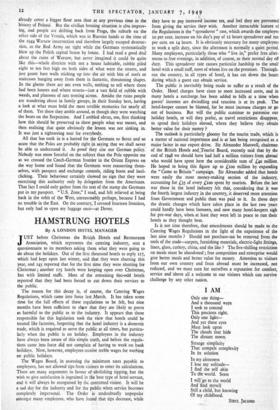HAMSTRUNG HOTELS
By A LONDON HOTEL MANAGER
Jbefore Christmas the British Hotels and Restaurants Association, which represents the catering industry, sent a questionnaire to its members asking them what they were going to do about the holidays. Out of the first thousand hotels to reply 117, which had kept open last winter, said that they were shutting this year, and 145 reported that for the first time they were shutting for Christmas ; another 115 hotels were keeping open over Christmas, but with limited staffs. Most of the remaining boo-odd hotels reported that they had been forced to cut down their services to the public.
The reason for this decay is, of course, the Catering Wages Regulations, which came into force last March. It has taken some time for the full effects of these regulations to be felt, but nine months have been sufficient to show that they are likely to prove as harmful to the public as to the industry. It appears that those responsible for this legislation took the view that hotels could be treated like factories, forgetting that the hotel industry is a domestic trade, which is required to serve the public at all times, but particu- larly when the public is on holiday. Employees in the industry have always been aware of this simple truth, and before the regula- tions came into force did not complain of having to work on bank holidays. Now, however, employees receive treble wages for working on public holidays.
The Wages Board, in assessing the minimum rates payable to employees, has not allowed tips from visitors to enter its calculations. There are many arguments in favour of abolishing tipping, but the wish to give satisfaction is ingrained in the best type of hotel servant, and it will always be recognised by the contented visitor. It will be a sad day for the industry and for the public when service becomes completely impersonal. The Order is undoubtedly unpopulat amongst many employees, who have found that tips decrease, while
they have to pay increased income tax, and feel they are prevented from giving the service they wish. Another intractable feature of the Regulations is the " spreadover " rate, which awards the employee to per cent. increase on his day's pay of 12 hours spreadover and roc per cent. on 14 hours. It is obviously necessary for many employees to work a split duty, since the afternoon is normally a quiet period. Many employees, particularly those who " live in," prefer free after- noons to free evenings, in addition, of course, to their normal day off duty. This spreadover rate causes particular hardship to the small hotel with a small staff, most of whom live on the premises. Through- out the country, in all types of hotel, it has cut down the hours during which a guest can obtain service.
The public is inevitably being made to suffer as a result of the Order. Hotel charges have risen to meet increased costs, and in many hotels a surcharge has been added to bills at a time when guests' incomes are dwindling and taxation is at its peak. The hotel-keeper cannot be blamed, for he must increase charges or go out of business. But will the public continue to patronise our holiday hotels, or will they prefer, as travel restrictions disappear, to spend their holidays abroad, where they believe they obtain better value for their money ?
The outlook is particularly gloomy for the tourist trade, which is a matter of national importance and is at last being recognised as a major factor in our export drive. Sir Alexander Maxwell, chairman of the British Hotels and .Tourist Board, recently said that by the end of 1948 we should have had half a million visitors from abroad who would have spent here the considerable sum of Lzto million. He hoped to bring this figure up to £roo million by expanding the " Come to Britain " campaign. Sir Alexander added that hotels were easily the most money-snaking section of the industry, accounting for £35 of every Doc> spent by tourists. Before the last war those in the hotel industry felt that, considering that it was the fourth largest industry in the country, it deserved more attention from Government and public than was paid to it. In those days the drastic changes which have taken place in the last two years could hardly have been foreseen, and now many hotel-keepers sigh for pre-war days, when. at least they were left in peace to run their hotels as they thought best.
Is it not time therefore, that amendments should be made to the Catering Wages Regulations in the light of the experience of the last nine months ? Should not purchase-tax be removed from the tools of the trade—carpets, furnishing materials, electric-light fittings, linen, glass, cutlery, china, and the like ? The five-shilling restriction on meals must be abandoned ; free competition and enterprise would give better meals and better value for money. Attention to visitors from our own country and from abroad must be increased, not reduced, and we must earn for ourselves a reputation for comfort, service and above all a welcome to our visitors which can survive challenge by any other nation.






































 Previous page
Previous page